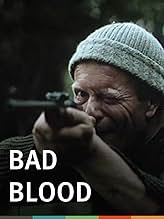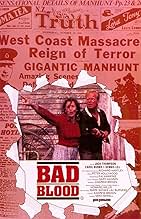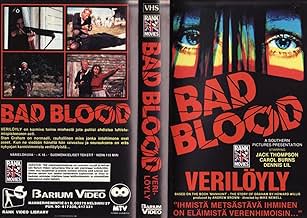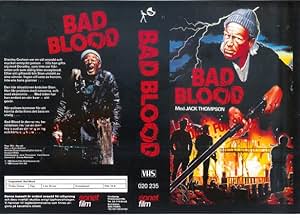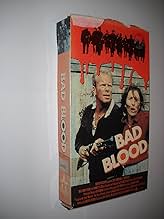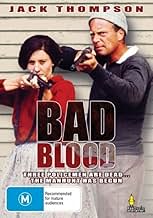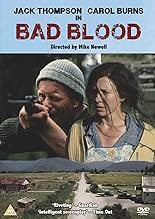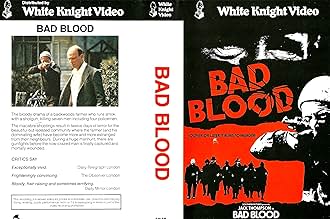Aggiungi una trama nella tua linguaDuring World War 2, a farmer in New Zealand murders seven people, and the police, along with local Maori trackers, hunt him in the bush country.During World War 2, a farmer in New Zealand murders seven people, and the police, along with local Maori trackers, hunt him in the bush country.During World War 2, a farmer in New Zealand murders seven people, and the police, along with local Maori trackers, hunt him in the bush country.
- Regia
- Sceneggiatura
- Star
Alan Jervis Wilks
- Ralph Frederic
- (as Alan Jervis)
Recensioni in evidenza
True story set in a farming community in New Zealand during WW2 where the government decrees that all firearms must be collected by the police. However when the police approach increasingly paranoid, broke and struggling to keep his family fed Stan Graham's (Jack Thompson) he refuses to hand his weapon over and ends up killing seven people including a number of policemen. He is then subject to one of the biggest manhunt's in New Zealand's history.
Whilst certainly gritty and brutal with Stan depicted as a simple, but ruthless killer, you do feel a degree of sympathy for him and his wife as they are left with nothing and facing a bleak future. The local townsfolk are none too bright either, generally disliking the family and treating the hunt as a giant jolly never seemingly understanding what they have on their hands. The case became a considerable cause celebre and political hot potato in New Zealand as in some parts Stan was viewed as a hero in such socially troubling times. Quite excellent performances from Thompson and Carol Burns as his supportive but equally crazed wife, this is now rightly seen as a New Zealand classic.
Whilst certainly gritty and brutal with Stan depicted as a simple, but ruthless killer, you do feel a degree of sympathy for him and his wife as they are left with nothing and facing a bleak future. The local townsfolk are none too bright either, generally disliking the family and treating the hunt as a giant jolly never seemingly understanding what they have on their hands. The case became a considerable cause celebre and political hot potato in New Zealand as in some parts Stan was viewed as a hero in such socially troubling times. Quite excellent performances from Thompson and Carol Burns as his supportive but equally crazed wife, this is now rightly seen as a New Zealand classic.
This film is based around a true story and the factual novel Manhunt - the story of Stanley Graham. One of the better things about this movie is the lack of sensationalism. Usually in stories of similar content the writers or director choose one standpoint from which to tell the tale. Here though, the writers, Andrew Brown & Harrold Willis, along with the director, Mike Newell, have decided in neutrality. This gives the viewer full control over what they choose to believe.
Newell chooses to keep the pace steady and even. This works well with the concept of setting the facts before the audience. It allows them to have time to consider what's happening in the story and to draw their own conclusions. This is one of the types of movies I prefer. One that wants and requires audience participation. There's nothing new or exciting about the camera work or the direction. Though, Newell does give his public some nice iconic shots to keep their interest.
As for the story, Brown and Wills give the audience a straight-forward facts based tale of a mentally confused man... or was he?
For some reason, during World War II the New Zealand government sequestered fire-arms. Farmer, Stanley Graham, will not give up his rifle. I have to admit the law appears strange. If you were in the National Guard you could keep your fire-arms and even if you were a woman you could keep your guns. Graham's wife is allowed to keep her .22 rifle and later she purchases a .33 to replace her husbands. I'm not sure if it was farmers who the law applied to. Or if Graham was of Germanic descendants. Either way, the law only helps to cement Graham's paranoia that the government and the townsfolk are out to get him.
The townsfolk are ambivalent towards the family. As time passes though they become more concerned and worried and the gossip starts. When Graham and his wife hear the hushed tones of their neighbours as they pass by their paranoia grows. So when anything bad happens on the farm it's not the hand of God or bad luck; it's the work of their neighbours. So when the police come to take away the rifles it's not surprising when things get out of hand.
The way the story is told you're not sure that the townsfolk aren't responsible for some of the family's bad luck. You also get the idea that Dorothy Graham may be a major contributor to her husband's persecution complex. Is she as broken as him? Or is she being a good wife and standing by him, come what may? Sometimes a good wife can get you killed...
The actors are good in their parts. None of them stands out as being better than the rest and this is perfect for this movie. It adds great strength to the normalcy of the characters and situation. This is one of the rare times that being average actually helps propel the story and make the movie stronger.
This is a movie I would recommend if you like reality-based tales. It's enjoyable, thought-provoking, and powerful. I'm still thinking about the story and it's been three days since I watched the film. I'm also thinking about hunting out the book as novels tend to go into more depth... Well worth a watch.
Newell chooses to keep the pace steady and even. This works well with the concept of setting the facts before the audience. It allows them to have time to consider what's happening in the story and to draw their own conclusions. This is one of the types of movies I prefer. One that wants and requires audience participation. There's nothing new or exciting about the camera work or the direction. Though, Newell does give his public some nice iconic shots to keep their interest.
As for the story, Brown and Wills give the audience a straight-forward facts based tale of a mentally confused man... or was he?
For some reason, during World War II the New Zealand government sequestered fire-arms. Farmer, Stanley Graham, will not give up his rifle. I have to admit the law appears strange. If you were in the National Guard you could keep your fire-arms and even if you were a woman you could keep your guns. Graham's wife is allowed to keep her .22 rifle and later she purchases a .33 to replace her husbands. I'm not sure if it was farmers who the law applied to. Or if Graham was of Germanic descendants. Either way, the law only helps to cement Graham's paranoia that the government and the townsfolk are out to get him.
The townsfolk are ambivalent towards the family. As time passes though they become more concerned and worried and the gossip starts. When Graham and his wife hear the hushed tones of their neighbours as they pass by their paranoia grows. So when anything bad happens on the farm it's not the hand of God or bad luck; it's the work of their neighbours. So when the police come to take away the rifles it's not surprising when things get out of hand.
The way the story is told you're not sure that the townsfolk aren't responsible for some of the family's bad luck. You also get the idea that Dorothy Graham may be a major contributor to her husband's persecution complex. Is she as broken as him? Or is she being a good wife and standing by him, come what may? Sometimes a good wife can get you killed...
The actors are good in their parts. None of them stands out as being better than the rest and this is perfect for this movie. It adds great strength to the normalcy of the characters and situation. This is one of the rare times that being average actually helps propel the story and make the movie stronger.
This is a movie I would recommend if you like reality-based tales. It's enjoyable, thought-provoking, and powerful. I'm still thinking about the story and it's been three days since I watched the film. I'm also thinking about hunting out the book as novels tend to go into more depth... Well worth a watch.
This movie is boring and dumb. It is boring because they didn't take their time making it. They weren't thinking clearly. Nothing happens for the first hour. And then the wife shouts "POISONDOG" and then nothing happens for the rest of the movie. If you're a fan of the phrase "POISONDOG" or other phrases like that, or Jack Thompson II films, then check out the glory that is... Bad Blood! Otherwise avoid like plague. International. 2000.
Don't let the badly chosen B-movie-ish title fool you, this film is better than that. Set in rural New Zealand during the early stages of WWII in the 1940s, this film portrays the true story of Stanley Graham, a poor farmer with a wife and two kids. Unable to connect with the more well-bred surrounding community, and treated as outcasts (part of that being their own fault), he and his wife become increasingly paranoid about the bank and mortgage companies foreclosing on their small plot of land because of their ever-increasing debts. Making matters worse, the local police chief confiscates Graham's best firearm for use in the war, further enraging him and convincing him that the whole town is out to get him and his family. When the police finally do come to confiscate his land, he cracks up - killing the officers, fleeing, and becoming a fugitive in what became the biggest manhunt in New Zealand history.
The best thing about this film is its topicality, which extends far beyond the specific time and place portrayed here. There are parallels here to the cases of David Koresh and Randy Weaver here in the U.S. - two other crazed rural isolationists obsessed with firearms and perpetuators of violence when confronted by government officials. In fact, director Newell does a fine job of setting up in the beginning just how central a role firearms play in the daily life of this isolated community - they seem to be everywhere in the first few scenes, and even children play with toy guns intensely. A film like this pokes holes in the rhetoric of the NRA which says defiantly, "Guns don't kill people, people kill people." Well, yes, Graham is slightly nuts from the beginning, but how likely would the massacre he creates have been had he not had such easy access to the rifles, which play such a central part in his psychology? Also, it is interesting to note that Graham seems to be the kind of competent professional with a firearm that the NRA so often endorses as its core consituency, yet we don't seem him using it for any legitimate hunting purposes at all - only to kill other human beings.
Australian veteran actor Jack Thompson, as always, turns in a fine performance as Graham - totally immersing himself in the role of a cloistered-up nutcase with the us-versus-them mentality which would lead to an inevitable standoff with the outside world. Not surprisingly, he is much more adept at using his rifles than his pursuers, killing and wounding just about everyone he fires at, and creating an intense hatred in the posse organized to catch him.
Newell has done an excellent job of creating the small period details of the setting, from showing the organized women's war production to the local dance and rationing for the war in this community. Additionally, Gary Hansen's cinematography and camera-work has an exquisite feel for the New Zealand Landscape.
The major flaw is that here is a film which has traces of further ambitions beyond itself, but unfortunately did not capitalize upon them. The build-up of Graham and his wife's paranoia following real and imagined humiliations from the community in the first half is riveting. Unfortunately, the second half loses steam, as the organization of the posse and manhunt seems rather inconsequential and pedestrian. Graham supposedly became something of a folk hero to the country, but this is only hinted at by one or two lines from peripheral characters. Newell would have been wiser to expand this theme further: the pathology of Graham is definitely universal, and there are likely traces of it in any isolated rural community. That is much more interesting than an obligatory chase. However, these flaws owe more to the script than Newell's direction, which is very accomplished. Throughout the entire film, Newell's direction retains the conviction that we are witnessing important historical events unfolding. It is too bad that the script does not delve much deeper than the superficial storyline of a nutcase who kills several people and get chased by the police. Still worthwhile, though.
The best thing about this film is its topicality, which extends far beyond the specific time and place portrayed here. There are parallels here to the cases of David Koresh and Randy Weaver here in the U.S. - two other crazed rural isolationists obsessed with firearms and perpetuators of violence when confronted by government officials. In fact, director Newell does a fine job of setting up in the beginning just how central a role firearms play in the daily life of this isolated community - they seem to be everywhere in the first few scenes, and even children play with toy guns intensely. A film like this pokes holes in the rhetoric of the NRA which says defiantly, "Guns don't kill people, people kill people." Well, yes, Graham is slightly nuts from the beginning, but how likely would the massacre he creates have been had he not had such easy access to the rifles, which play such a central part in his psychology? Also, it is interesting to note that Graham seems to be the kind of competent professional with a firearm that the NRA so often endorses as its core consituency, yet we don't seem him using it for any legitimate hunting purposes at all - only to kill other human beings.
Australian veteran actor Jack Thompson, as always, turns in a fine performance as Graham - totally immersing himself in the role of a cloistered-up nutcase with the us-versus-them mentality which would lead to an inevitable standoff with the outside world. Not surprisingly, he is much more adept at using his rifles than his pursuers, killing and wounding just about everyone he fires at, and creating an intense hatred in the posse organized to catch him.
Newell has done an excellent job of creating the small period details of the setting, from showing the organized women's war production to the local dance and rationing for the war in this community. Additionally, Gary Hansen's cinematography and camera-work has an exquisite feel for the New Zealand Landscape.
The major flaw is that here is a film which has traces of further ambitions beyond itself, but unfortunately did not capitalize upon them. The build-up of Graham and his wife's paranoia following real and imagined humiliations from the community in the first half is riveting. Unfortunately, the second half loses steam, as the organization of the posse and manhunt seems rather inconsequential and pedestrian. Graham supposedly became something of a folk hero to the country, but this is only hinted at by one or two lines from peripheral characters. Newell would have been wiser to expand this theme further: the pathology of Graham is definitely universal, and there are likely traces of it in any isolated rural community. That is much more interesting than an obligatory chase. However, these flaws owe more to the script than Newell's direction, which is very accomplished. Throughout the entire film, Newell's direction retains the conviction that we are witnessing important historical events unfolding. It is too bad that the script does not delve much deeper than the superficial storyline of a nutcase who kills several people and get chased by the police. Still worthwhile, though.
Bad Blood is the true story of West Coast (New Zealand) Eric Stanley Graham who, during the 1940's shot dead several people in the small village of Kowhitirangi, and sparked NZ's biggest manhunt in history. The film is both atmospheric and disturbing, and is well focussed on Graham and his family, and their gradual alienation from the small community. The bush setting only amplifies this claustrophobia. Both well acted and scripted, Bad Blood is worth more than a look.
Lo sapevi?
- QuizActors playing shot policemen, who had to lie on the floor in pools of blood for long periods of time, to relieve the boredom, would sing and whistle the Monty Python song "Always Look on the Bright Side of Life", which had been at the time recently popularized in the movie Brian di Nazareth (1979).
I più visti
Accedi per valutare e creare un elenco di titoli salvati per ottenere consigli personalizzati
Dettagli
- Data di uscita
- Paesi di origine
- Lingua
- Celebre anche come
- The Shooting
- Luoghi delle riprese
- Nuova Zelanda(filmed entirely on location in)
- Aziende produttrici
- Vedi altri crediti dell’azienda su IMDbPro
- Tempo di esecuzione1 ora 45 minuti
- Colore
- Proporzioni
- 1.85 : 1
Contribuisci a questa pagina
Suggerisci una modifica o aggiungi i contenuti mancanti


